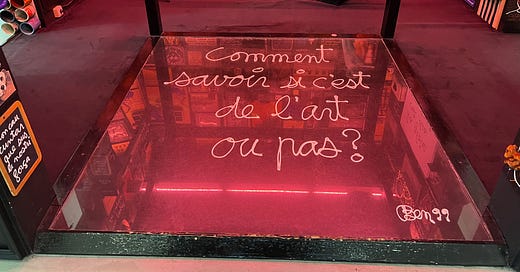Happy Friday!
This week I saw an artist having a Big Thought:
Comment savoir si c’est de l’art ou pas? (How do we know if it’s art or not?)
Make u think.
Helen
A Russia Scholar on Stalin, Putin and Ukraine (New Yorker)
Russia is a great power, but not the great power. . . In trying to match the West or at least manage the differential between Russia and the West, they resort to coercion. They use a very heavy state-centric approach to try to beat the country forward and upwards in order, militarily and economically, to either match or compete with the West. And that works for a time, but very superficially. Russia has a spurt of economic growth, and it builds up its military, and then, of course, it hits a wall. It then has a long period of stagnation where the problem gets worse. The very attempt to solve the problem worsens the problem, and the gulf with the West widens. The West has the technology, the economic growth, and the stronger military.
The worst part of this dynamic in Russian history is the conflation of the Russian state with a personal ruler. Instead of getting the strong state that they want, to manage the gulf with the West and push and force Russia up to the highest level, they instead get a personalist regime. They get a dictatorship, which usually becomes a despotism. They’ve been in this bind for a while because they cannot relinquish that sense of exceptionalism, that aspiration to be the greatest power, but they cannot match that in reality.
David Remnick interviews Stephen Kotkin on Russian history. Interesting, though he brushes away the China question—if authoritarian regimes are so useless, why is the Chinese economy doing so well?
Also contains this nugget, which you wouldn’t have guessed from recent press coverage: “But it turned out that “the television President,” Zelensky, who had a twenty-five-per-cent approval rating before the war—which was fully deserved, because he couldn’t govern—now it turns out that he has a ninety-one-per-cent approval rating. It turned out that he’s got cojones.”
Online Jerks Are Offline Jerks (The Atlantic)
A 2021 Pew Research report found that 41 percent of U.S. adults have personally experienced some form of online harassment. Fifty-five percent think it is a “major problem.” Seventy-five percent of the targets of online abuse say their most recent experience was on social media. I can’t think of any other area of voluntary interaction—with the possible exception of driving in rush-hour traffic—where people so frequently expose themselves to regular abuse.
But we are not helpless in the face of either online abusers or the ones flipping us off on the highway. In fact, they are mostly one and the same: bullies with personality disorders. And you can protect your happiness by dealing with them both in some tangible, practical ways.
Enjoyable piece about why it feels like the internet is so full of arseholes: “Trolls are attracted to internet forums such as Twitter, where they can get their toxic jollies without much threat of being beaten up, while moral people exit—all increasing the troll-to-normal ratio over time. If you feel as though your relationship with social media has gotten worse over time, this might explain why. . . One scholar has proposed that this tendency to internalize trollish insults results from a phenomenon called solipsistic introjection: reading written communication can feel like hearing a voice inside our own head. As such, a troll’s insults can be experienced as a form of self-criticism, which is hard to ignore.” (Emphasise mine. Hooooboy.)
Also, this is a general recommendation for Arthur Brooks’s column on happiness, which is self-help with actual research behind it.
Quick Links
Every Shakespearean actor. (TikTok)
This piece could have been headlined “Why I Am A Coward,” and I don’t mean that in a bad way. .
Katie Herzog on “how an academic grudge turned into a Me Too panic.”
Substack’s ideology: an argument that people will “hate-read” but they won’t “hate-pay”.
Have you made Wordle part of your morning routine? You are a little baby. I now do Wordle, Quordle, Sedecordle (but for some reason not Octordle), Worldle and Globle. (Worldle, being French, is very capricious about what it believes is a country.)
“Mr. Smith did not reveal the name that he had selected. English words that are the same or similar in many other languages include taxi, tea, coffee, chai, sugar, pajama, radio and soup.” I sincerely hope that BuzzFeed founding editor Ben Smith’s new venture is called Pajama Soup (New York Times).
See you next time!





As well as all the word puzzles have a go at nerdle (https://nerdlegame.com/) - the numbers equivalent